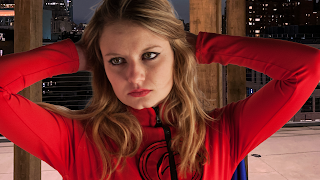Campy Writing
Let's talk about camp!
Generally, budding comic & sci-fi creators don't want their work to be described as campy. They want it to be dramatic and exciting. Maybe even a little dark and brooding... And after all that hard work to get to a finished product... If the first thing someone says is that it's campy... It can be a big letdown!
So, today, I thought I'd talk a little bit about what exactly campy writing is, why it happens, and how to avoid it if you're attempting something more serious.
Let's dive in!
To begin, before we really start grinding away at camp, it should be mentioned that there are some excellent examples of campy storytelling. At the top of my list... Batman '66. It's fun. It's lighthearted. It's colorful. It's comforting. There is a big difference between intentional camp and unintentional camp, and it's unintentional camp that almost always fails. We're going to analyze both, but before we do, let's first define what campy writing actually is.
The most accepted definitions describe camp as something of an aesthetic style mixed with over-the-top performances and a sense of irony. But I don't think that's entirely accurate. The visuals are certainly an element of camp, but there are plenty of properties with those key visuals that I wouldn't describe as campy.
Camp is found in the writing, and a better way to define it, is by analyzing the elements of story rather than the visual style. When we do that, it all comes down to non-existent stakes. Campy writing, by design, builds flat characters with minimal depth and personality. They're paper thin, with no real motivations beyond their immediate mission. The good guys are generically good. The bad guys, generically bad. At the same time, the dramatic weight of the story is also removed. Nothing that the characters do or say particularly maters. There's no tension. Frequently, because the scenarios devised for the heroes to overcome are so ludicrous, they bear no resemblance to reality. The heroes will win, the villains will lose, and the lack of any real drama makes the victories entirely meaningless.
So, why does Batman '66, along with other successful intentionally campy properties, work so well while unintentional camp fails?
That's where the visual style comes into play! The aesthetics, the costumes, the color, the performances... They don't make something campy, they elevate campy writing into a genre-based art. Batman '66 is entertaining because the pageantry on screen takes priority over the story. We don't watch the show to explore the inner workings of Bruce Wayne or his rouges gallery. We don't even watch to find out what happens next. When you think about it, all the episodes are essentially the same thing! We watch the show to see lively visuals and skilled actors hamming it up. The ridiculous writing plays into the over-the-top aesthetics, and the end result is just plain fun!
Now let's talk about unintentional camp. It generally happens for one of two reasons. Either the writing is solid, but the production value can't rise to that same level of quality. Or, just the opposite... The writing is weak and the production can't overcome the deficiencies of the narrative. Or, in worst cases, it's a combination of both.
Let's talk about the first possibility. Good writing with poor production. In this example, the drama is in the script, but deficiencies in production and acting can weaken the material. If it looks fake to the viewer, it can create what I'd describe as artificial camp. The viewer doesn't believe what they're seeing, because of a lack of production value and poor performances, so they define the work as campy, when it reality, it's a result of poor production. It sounds like a bleak indictment of the work, but the positive of this is that the narrative works! That's a huge accomplishment, and the story is the foundation of filmmaking. Everything else can be overcome with more experience and better actors.
As for the second possibility, that it's a scripting problem... That happens when an idea isn't yet fully realized. If it's compounded by bad production and acting, it's a bigger problem. But in that case, the final product isn't usually described as campy. It's just described as bad.
Determining if it's a scripting problem or a production problem can be difficult. Especially when it's your production. The best way to figure it out is by really looking at the final product. When you really look at it critically, you'll know.
So... Now that we've examined camp, it's time to talk about camp's close cousin... Cheese... But that'll have to wait until next week...



Comments
Post a Comment